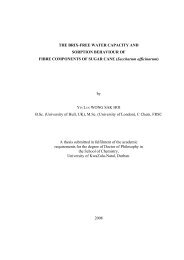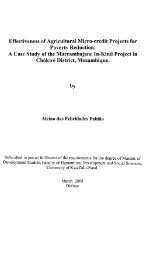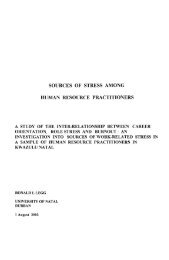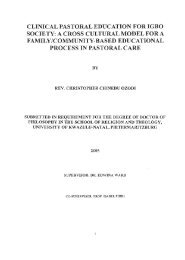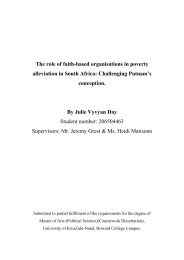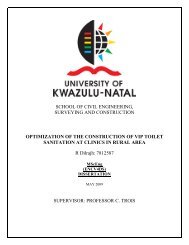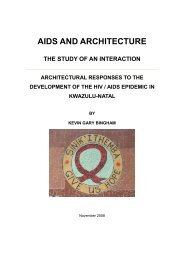View/Open - ResearchSpace - University of KwaZulu-Natal
View/Open - ResearchSpace - University of KwaZulu-Natal
View/Open - ResearchSpace - University of KwaZulu-Natal
You also want an ePaper? Increase the reach of your titles
YUMPU automatically turns print PDFs into web optimized ePapers that Google loves.
4.3.3 Need for proper hygiene in the community<br />
Most <strong>of</strong> the participants in focus group discussions talked more about the importance <strong>of</strong><br />
infection control practices for prevention <strong>of</strong> cross infections. However, one participant in one<br />
<strong>of</strong> the focus groups stated that, most people in the community in which she served did not<br />
practice domestic hygiene such as opening <strong>of</strong> windows and cleaning their surroundings. She<br />
felt that infection control practices were important in such communities:<br />
“I also feel that it is important because many people in our area are not taught about these<br />
things so they don’t even open windows; their places are dirty they just don’t care about their<br />
health so…it is very important… for them to change their unhygienic habits or behaviours.<br />
(Focus group 4, organisation F)<br />
4.4 Resources available for infection control practices in HBCOs<br />
Participants were asked about resources that they had for practicing infection control. Based<br />
on what was discussed in focus groups and interviews, materials, knowledge and skills were<br />
the available resources for infection control practices.<br />
4.4.1 Knowledge and skills<br />
Most volunteer caregivers were trained when they were enrolled to work in HBCOs by the<br />
department <strong>of</strong> health. Their training was usually a once <strong>of</strong>f training which lasted for two to<br />
three weeks. The training covered basic topics on HIV/AIDS, T.B prevention methods, basic<br />
nursing care, direct observation treatment (DOT) and infection control practices. The training<br />
equipped volunteer caregivers with various skills ranging from basic counselling, nutrition,<br />
training for household caregivers and mentoring orphans. Furthermore, majority <strong>of</strong> the<br />
volunteer caregivers mentioned that they gained skills <strong>of</strong> showing love and compassion to<br />
their clients when practicing infection control:<br />
“Being a volunteer is not something that you do because you see other people doing it. It is<br />
something that emanates from within you, from love and your passion up until you reach a<br />
stage where you can help others. They taught us that when you help a sick person you do not<br />
act disgusted, you must be relaxed, smile and show love. Even when you touch their wound<br />
you do not act disgusted, you smile.” (Focus group 4, organisation D)<br />
Majority <strong>of</strong> volunteer caregivers were confident about the knowledge that they acquired from<br />
the training. They indicated that they acquired knowledge and skills on infection control<br />
practices such as how and when to wear gloves; masks; aprons; how to bath and change a<br />
44




